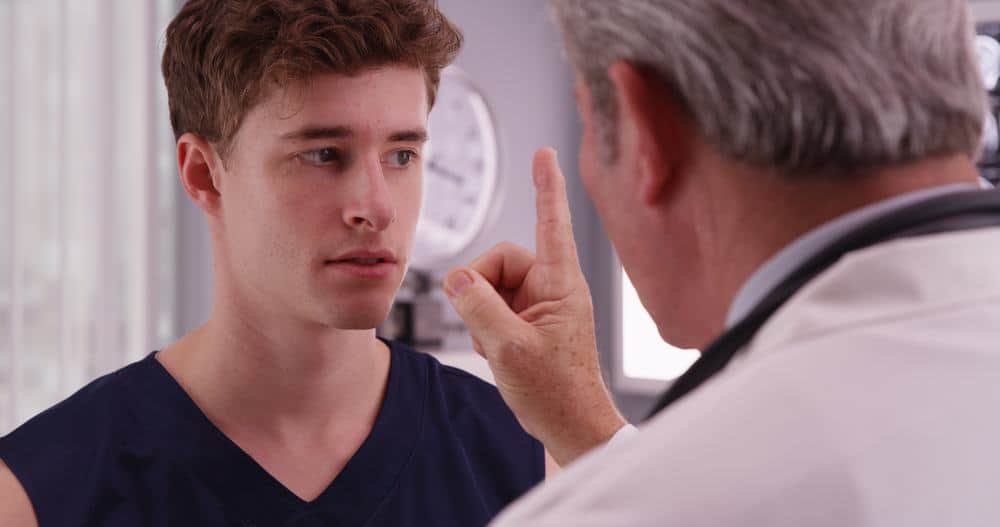The last thing you might expect to be dealing with after a car accident is a concussion. However, head injuries can happen, whether you hit your head on part of the vehicle or your head and neck get severely jolted around during the crash. While many people who suffer a concussion notice symptoms right away, it can also take hours or even days for symptoms to appear.
That’s what makes how to tell if you have a concussion tricky. A concussion is the most common type of traumatic brain injury, or TBI, and there are three different types depending on the severity. A concussion can result in symptoms that last for days, weeks, or even longer after a car accident. If you have been involved in a car accident and suffered a concussion, you will want to see a car accident doctor as soon as possible to get started on important treatments to help you recover.
Signs & Symptoms of Concussion After a Car Crash

Whether you have obvious signs or symptoms of an injury after a car crash, it’s best to get checked out by a doctor afterward. Some signs and symptoms of a concussion can take a while to fully appear. It is important to note that not everyone who suffers a concussion will experience all these signs and symptoms of a concussion. Talk to your doctor if you notice one or more of these signs or symptoms after a car crash and whether you experience any new or worsening symptoms as the days and weeks go on.
Headaches
Headaches commonly occur with a head injury, like a concussion. You may experience headaches immediately following a blow to the head or violent jostling from the car accident. You could also develop headaches in hours or days afterward.
Dizziness
Dizziness and instability are also common signs and symptoms of a concussion after a car crash. You may feel unsteady on your feet or feel like the room is spinning when you try to move around. People who experience dizziness with a concussion may also report feeling lightheaded with certain movements.
Nausea & Vomiting
A concussion can result in nausea or vomiting as your brain reacts to the sudden injury. Head trauma from a car accident can result in too much or too little blood flow to the brain or disrupt neurotransmitters, resulting in symptoms like nausea and vomiting.
Disorientation
A concussion can also cause cognitive impairments, and one common sign is disorientation after an accident. You may experience confusion or feel disoriented after a car crash, especially if you hit your head or suffered another injury like whiplash.
Sensitivity to Light & Sound
Concussions can also commonly result in an increased sensitivity to light and sound. People who suffer a concussion may find bright lights or sunlight increase symptoms like headaches. Similarly, loud sounds can also increase headaches, dizziness, and feelings of disorientation.
Excess Fatigue
Excess fatigue may also occur with a concussion. Some people experience extra tiredness but an inability to fall or stay asleep, while other people may sleep for longer periods of time. It is important to talk to your doctor about fatigue and sleep problems after a concussion, especially in the first 24-48 hours after the initial accident.
Memory Loss
Some people may struggle to remember the events leading up to the car crash and concussion, while others may experience memory loss surrounding the moments right afterward. Any inflammation or damage to the brain can impact your ability to recall information, though this type of memory loss may be temporary.
Mood Changes
A concussion can lead to changes in mood or behavior, including irritability, anxiety, or depression. The shock and stress of getting into a car accident may temporarily mask mood changes, and these may not become apparent until days or weeks after the accident.
Loss of Consciousness
In some cases, a concussion can result in a temporary loss of consciousness. You may not realize you lost consciousness, but this could be observed by others around you. A loss of consciousness with a head injury, like a concussion, can also exacerbate other symptoms.
How Long Do Concussions Last After a Car Accident?
The duration of a concussion and its symptoms can vary from person to person and will depend on several factors. The severity of the injury, a person’s age and overall health, and a history of prior concussions all impact how long a concussion will last after a car accident. While many people recover from a concussion within a few days to a few weeks, some people may experience symptoms for much longer. Here are the three levels of concussion based on the severity of the injury and what you can expect with symptoms and timing:
Grade 1 Concussion
A grade 1 concussion is the mildest form of a TBI and will typically result in mild symptoms, including headache, dizziness, confusion, and ringing in the ears. Symptoms of a grade 1 concussion typically go away within a few hours of the initial accident.
Grade 2 Concussion
A grade 2 concussion refers to a TBI where a person may lose consciousness for a few seconds or minutes. Other signs and symptoms of a grade 2 concussion include nausea or vomiting, memory loss, and confusion lasting longer than 15 minutes.
Grade 3 Concussion
A grade 3 concussion is the most severe type of concussion, where the loss of consciousness may occur for several minutes or longer. Signs and symptoms include severe confusion, memory loss, headaches, dizziness, and sensitivity to light or noise.
Can Car Accident Concussion Lead to Permanent Damage?
A concussion can result in serious or even permanent damage. A person who has suffered repeat concussions is at greater risk for severe symptoms and a longer recovery period. A condition known as post-concussive syndrome may also occur, in which a person experiences extended symptoms of a concussion for months or even years after the accident.
Post-concussive syndrome can include headaches, dizziness, irritability, difficulty with concentration and memory, anxiety, depression, and sleep disturbances. Risk factors for post-concussion syndrome include a person’s age and overall health, along with the severity of the initial injury. A history of prior concussions, stress, anxiety, or depression may also impact the severity and duration of symptoms. While some cases of a concussion can result in long-term or permanent damage, most people recover fully from a concussion with proper medical attention and time.
What to Do for Concussion Diagnosis & Treatment

A concussion can be diagnosed by a combination of medical history, physical examination, and evaluation of symptoms. Your doctor will talk to you about how the injury occurred and what symptoms you are experiencing, and may also assess your balance, coordination, and reflexes. Your doctor may also order additional tests like a CT scan or MRI to assess the brain and also rule out other injuries.
Treatment options will vary depending on your specific symptoms and the severity of your injury. Rest is an essential aspect of recovering from a concussion, along with a gradual return to activities. If you have suffered a concussion from a car crash, then schedule an appointment today to get a thorough diagnosis and treatment plan with a doctor at Pro-Care Medical Center near you.



